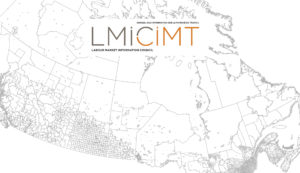Our Mission
To empower Canadians, including employers, workers, job seekers, academics, policy makers, educators, career practitioners, students, parents and underrepresented groups with timely and reliable labour market information and insights in an engaging way that supports their decision-making process.
Our Mandate
To improve the timeliness, reliability and accessibility of labour market information to facilitate decision-making by employers, workers, job seekers, academics, policy makers, educators, career practitioners, students, parents and underrepresented populations.
Our Values
Client Centric and Demand Driven
We must be timely, relevant, responsive and accessible to consumers, users, providers and other LMI stakeholders.
Inclusive and Collaborative
We are committed to providing labour market information and insights that respect the diversity of perspectives and needs that prevail across Canada.
Integrity and Transparency
We lead with integrity through a relentless focus on quality, reliable labour market information and insights.
Innovative and Evolutionary
We are committed to developing and embracing innovative ideas, new methods and new platforms through our collaborative and inclusive efforts.
Message from the Chair
of the Board of Directors
In this second year of operations, LMIC has firmly established itself as a reliable source of sound advice and insights on the Canadian labour market. Working with public and private partners across all jurisdictions in Canada, LMIC is becoming known for its ability to collaborate on a range of innovative labour market information (LMI) projects. In addition, general awareness of the LMIC’s projects, data dashboard and publications has grown as web-based resources are being accessed more frequently.
LMIC undertook an external review this year to ensure that it is well positioned to meet the evolving labour market information needs of Canadians.
As the year ended in March, the COVID-19 pandemic began. The health and well-being of Canadians was, and remains, a top priority. This global health crisis has also dramatically changed many aspects of work, and LMIC is orienting itself to help Canadians overcome these challenges.
LMIC's mandate is to provide Canadians with quality labour market information to help them make more informed choices. Building on a foundation of strong partnerships and growing public awareness of LMIC’s value, the LMIC is well positioned to support Canadian’s through a strong labour market recovery in the wake of the COVID-19 pandemic and execute its mandate in the years to come.

Bindi Sawchuk

Steven Tobin
Message from the Executive Director
As an organization, LMIC is still very much in its start-up phase. This report — only our second — is an important milestone for ensuring accountability and demonstrating our organization’s transparency and progress in helping Canadians make more informed decisions. This report demonstrates that the last fiscal year was marked with significant progress on a number of projects to collect, analyze and distribute quality labour market information to Canadians.
Yet, even in normal times, it feels strange to be looking back rather than focusing on how we can continue to seek and develop solutions to support Canadians for today and tomorrow. In the context of COVID-19, that point is particularly salient. Jobs, incomes, families, workplaces and businesses are confronted with considerable uncertainty.
Our efforts are now focused on how our work can best assist in building an inclusive and full recovery by providing labour market information and insights on how jobs, and their related work requirements, are evolving. We have never been more aware of the importance of our work. Building the necessary labour market information infrastructure can help us through this crisis by supporting the resilience of Canadians and the competitiveness of our economy going forward.
Message from the National Stakeholder Advisory Panel Chair
During the past year we refreshed the National Stakeholder Advisory Panel (NSAP) membership to increase the variety of stakeholders, as well as their social and geographic diversity. NSAP members, old and new, are a fount of expertise on the quality and use of labour market information in Canada.
We also took the opportunity to survey NSAP members on how to continue improving the pan-Canadian LMI ecosystem. We agreed that Canada enjoys a sophisticated, mature, widely used set of LMI resources. But we can and must do better. Indeed, the need for high quality, usable — and widely used — LMI is greater than ever.
Events of this year have demonstrated the extent to which labour markets can experience large scale, rapid disruptions. These can be driven by technology, business model innovations, climate change, social, political and economic disruptions, and other surprises like COVID-19. As we consider how to support Canadians through such disruptions, we are working diligently with LMIC to achieve several objectives: 1) foster a culture of LMI awareness, knowledge and literacy; 2) improve overall quality and accessibility of LMI; and 3) modernize publicly available LMI including, but not limited to, real-time LMI.
I’m pleased to report that the LMIC organization and Board have been very receptive to NSAP advice. We are more than optimistic that LMIC will apply NSAP stakeholder ideas for achieving its mandate and ensuring that Canadians gain the benefits of world-leading LMI capabilities.

David Ticoll
Introduction
The Future of Work is Now
For the past several years, our collective attention has been focused on issues related to an unprecedented period of job growth and uncertainty regarding the future of work. In 2019–2020, LMIC focused on providing relevant labour market information (LMI) data and insights to help Canadians navigate these challenges.
In March 2020, near the end of our fiscal year, the world of work dramatically shifted with the onset of COVID-19 and the ensuing labour market and social challenges that will persist well into the future. The future of work is now very much about the present and about how our collective attention, including on the provision of LMI, should shift to support recovery efforts.
Partnerships and Stakeholders
Working Collaboratively to Make a Difference
As a new player in the pan-Canadian LMI ecosystem, LMIC has continued to rely extensively on developing partnerships in an effort to improve labour market information. One of the partnerships we have fostered is with the Forum of Labour Market Ministers whose mandate is to address shared labour market issues across federal, provincial and territorial governments.
This year we also partnered with several organizations to collect more and better LMI. We collaborated closely with Statistics Canada to deliver local, granular data to a wide range of stakeholders. Together with Statistics Canada and Employment and Social Development Canada (ESDC), we launched a joint project assessing how to better understand jobs through the lens of skills.
To support and improve official data sources, we gathered and shared job posting data collected by Vicinity Jobs. In our constant efforts to identify the specific LMI needs of various user groups, we collaborated with Refresh Market Research to engage with first-year college and university students in a series of online, immersive dialogues. We conducted a survey of NEET youth (those not in employment, education or training) with the polling firm IPSOS.
This year we published our first in-depth research report — accompanied by an interactive dashboard and other publications — on the earnings pathways of college and university students. Our new research partnership with Education Policy Research Initiative (EPRI) began our collaboration with the academic community to provide more in-depth analysis. This engagement with Canadian researchers expanded to new partnerships with academics at McMaster University and Ryerson University. We also participated in the Canadian Economic Association’s annual conference.
We also made considerable efforts to build relationships with career development practitioners such as Canadian Career Development Foundation and other actors in this space such as CERIC. After all, these organizations are the ones whose job it is to help Canadians of all ages and stages throughout their careers, Through these partnerships, we worked collaboratively to make labour market information more accessible, to improve knowledge sharing and exchange of best practices and to highlight the importance of labour market information in supporting the decisions of Canadians.
Our important role in helping to guide initiatives throughout the pan-Canadian LMI ecosystem is also expanding. Our Executive Director serves an observer for the Future Skills Council, on the Advisory Board of the Future Skills Centre, and as a member of Statistics Canada’s Advisory Committee on Labour and Income Statistics. During this past fiscal year, our staff also served on a variety of other committees and associations, including the Brookfield Institute’s Employment in 2030 research project.
Ensuring Relevance and Credibility through Our Governance
The labour market is constantly changing and evolving. Our established networks and governance structures help to ensure that the organization is responsive to this changing environment. This support system includes the LMIC Board of Directors, National Stakeholder Advisory Panel and Labour Market Information Experts Panel. The individuals serving on these bodies share their own specialization, knowledge and experience to help foster the growth of the organization.
The Board of Directors is composed of 15 senior government officials representing each province and territory, as well as ESDC and Statistics Canada. Board members are responsible for determining direction and priorities, and ensuring that the activities of LMIC are conducted in a manner that both achieves its goals and are consistent with its vision, mission and strategic plan.
The National Stakeholder Advisory Panel (NSAP) provides strategic recommendations on organizational priorities and projects. NSAP is composed of non-government stakeholders who have substantial insight and expertise in LMI. A focus over the last year has been to expand the diversity and representativeness of NSAP. Having individuals of different backgrounds and with diverse perspectives is important to our organization since it offers a range of values, expertise, perspectives, and skills. This ensures that our work on the needs of Canadians is respectful, representative and innovative. This is a goal that we aim to reflect in our office, our work and our governance.
The Labour Market Information Experts Panel, acting as a key resource for feedback and advice, is consulted throughout the year based on the requirements of projects and initiatives. Its members are drawn from a variety of fields and sectors across the country.
By combining guidance and knowledge from these committees with our own organizational experience, we ensure that our goals and professional practice evolve to better meet the changing needs of Canadians.
A Strategic Plan to Improve Labour Market Information
Our 2018–2020 Strategic Plan is coming to a close at a time when the world of work faced a sudden and extraordinary shift. We continuously draw upon what we have learned to reassess and realign LMIC's goals with the needs of Canadians today and tomorrow. Collect, analyse and distribute continue to be the overarching themes that guide us but moving forward will be accompanied by the knowledge that we’ve gained from the past three years.
Collect

Gather & improve the availability of relevant labour market information to Canadians
Analyze

Undertake insightful, high-quality analyses of labour market information
Distribute

Provide Canadians with timely, relevant, reliable labour market information & insights in an effective manner
Collect
Public Opinion Research
To better understand how Canadians use LMI and address any gaps, we continued to share the results of our public opinion research stemming from last fiscal year’s partnership with Forum Research. To enrich these findings, we conducted a new survey to improve our understanding of the LMI needs of students and youth not in employment, education or training (NEET). We also built upon our initial set of surveys and dug deeper, through qualitative research, into how students engage with and use LMI in choosing an education and career pathway. We must continue to engage further with under-represented and vulnerable groups to improve our knowledge and understanding of Canada’s diverse LMI user base.
The results from these surveys have already been discussed in detail in the following publications:
Interactive Dashboard: Population Groups
Interactive Dashboard: Employers
Interactive Dashboard: Region
Qualitative Research on Students
Following our 2018 Public Opinion Research survey, we worked with Refresh Market Research to engage with 35 students at the crossroads of high school and post-secondary education (PSE). They participated in an online discussion on their use of LMI while making decisions about their choice of PSE and career plans. Our LMI Insight Reports no. 21, 26 and 27 share the results from this initiative. This research underscored how critical it is that students have access to individually tailored wage, skill and job outlook information to make the most informed education and career choices.
"Hourly wages are easier to compare with what I know… (whereas) annual salaries are preferred when thinking about long-term careers"
LMI Insights Report no. 21 - Wages
"In five years, I'll be out of school and looking for a career - so knowing these numbers will motivate me to ensure I will have a career in the industry I want."
LMI Insights Report no. 27 - Outlooks
"Without adapting and learning the skills of tomorrow, you will not be able to survive in the future."
LMI Insights Report no. 26 - Skills
NEET Quantitative Research
We conducted an online survey of NEET youth in Canada to better understand their unique LMI needs and challenges. Our analysis, released in our LMI Insight Report no. 17 and Interactive Dashboard on Population Groups, revealed that their main challenges in finding suitable work included lack of experience, lack of decent job opportunities and mental health issues.
We discovered that 20% of NEET youth surveyed were trying to decide what career to pursue within the next 12 months. To make this decision, they were looking for LMI related to job requirements, wages and benefits. Overall, these findings showed that LMI can play a pivotal role in providing NEET youth with detailed data contextualized to their specific needs and interests.
Percentage of NEET youth due to
family-related obligations
WOMEN
MEN
The top LMI needs
of NEET youth
FINDING THE RIGHT JOB
JOB MATCHES EXPERIENCE
Respondents planning to transition back into employment, education, or training
Main challenge for NEET youth when looking for a job is that they need more work experience
NEET respondents who
found LMI impactful
LMI Challenges ranked by NEET youth:
LMI IS NOT RELEVANT
TO THEM
COULDN'T FIND THE LMI
THEY WANTED
FOUND LMI HARD
TO UNDERSTAND
COULDN'T FIND LMI SPECIFIC TO THEIR LOCATION
Local, Granular Labour Market Information
In partnership with Statistics Canada, we launched a long-term initiative to identify and close LMI gaps related to the lack of local, granular, timely, frequent data. Together we published LMI Insight Report no. 15 to establish an evaluation framework for comparing data sources consistently. Additionally, the project began exploring new techniques for enhancing the “localness” of existing datasets. Through a working group of provincial and territorial partners, we examined possibilities for applying small area estimations methods to underutilized administrative datasets. We are now working to generate preliminary localized estimates.
Analyze
Students and Labour Market Outcomes
In partnership with Education Policy Research Initiative, we published a joint report focusing on the earnings pathways of college and university students who graduated from publicly funded, Canadian PSE institutions. The research placed particular emphasis on earnings differentials since graduation between men and women by credential and field of study.
Publications related to this project's findings include the following:
2010 Graduates:
EARNINGS INCREASE
OVER 5 YEARS
Earnings Differentials
WIDENS

For every credential in every year,
the gap in earnings between men
and women widens over time.
NARROWS

International students who stay to work in Canada tend to earn less than their Canadian counterparts at first, but the differences generally narrow over time.
Overall, women earn
LESS than men
after 5 years
Overall, international students earn
LESS than Canadians
after 5 years
The earnings gap is largest (%) for college-level certificate holders in education after 5 years.
The earnings gap is largest (%) for master's degree holders in education after 5 years.
Skills
Credentials and qualifications continue to be a mainstay in terms of the job market vernacular, but Canada’s continued economic success also relies increasingly on our ability to improve skills-related LMI. Over the course of 2019–2020, we worked with many partners — notably ESDC and Statistics Canada — to enhance our collective knowledge of the skill requirements of jobs in Canada. Specifically, our joint project with ESDC and Statistics Canada aims to assess how best to describe jobs in terms of their skill and other job/worker requirements.
The publications related to this project's findings include the following:
Future of Work
Much of the debate about the future of work and its implications has been narrow in focus. This has led to potentially false or misinformed conclusions. Our work in this area therefore focused on two streams. The first was to synthesize the latest research findings through our Future of Work (FoW) Annotated Bibliography. The second was to draw out the missing links in the future of work discussion and related literature. Through several publications, we have noted the importance of taking a systems approach that recognizes the interconnectedness of various trends, not just technology, and their joint implications for the labour market.
The publications related to this project's findings include the following:
Insight No. 12: Toward a systems framework for Technology and the Future of Work
Annotated Bibliography:
Future of Work
Distribute
Stronger Together
During this fiscal year, we built upon our credibility by leveraging partnerships and collaborations with like-minded organizations. From sharing content and cross-promotion efforts with the Future Skill Centre, to joint research efforts with the University of Ottawa, to webinars with the Canadian Career Development Foundation (CCDF), we began to amplify our message to expand our reach. By partnering with key stakeholders and industry leaders, we were able to tailor LMI to different audiences and needs to facilitate information sharing.
With over 28 media requests and 5 guest blogs with organizations such as CareerWise, Policy First Response, Future Skills Centre and the Ottawa Economics Association, this was our busiest media relations year to date. In addition, LMIC presented at 27 conferences and partnered with CCDF to deliver a webinar on LMI resources for career development practitioners who work with students.
Recognizing Change While Meeting the Diverse Needs of Canadians
To ensure that our product delivery aligns with the goals of our organization, LMIC has spent the past year implementing recommendations from two social media and web audits conducted in 2018-2019. As part of this work, we significantly revamped our digital presence and our website to improve accessibility. We also implemented feedback from our online community and subscribers to improve our monthly newsletter and to merge our Twitter accounts into one bilingual platform.
Surpassing Milestones
Page views
108% increase from last year
Dashboard views
12 Newsletters
delivered to:
PEOPLE OVER TWELVE MONTHS
Subscribers: 1,415
Total opens:
INCLUDING OPENS FROM EMAIL FORWARDS
Impressions
(137% increase from last year)
TWEETS
FOLLOWERS
CLICKS
ENGAGEMENTS
Nearly all #NEET youth (91%) say that #CdnLMI is useful for making career-related decisions, but finding relevant LMI for their situations remains a challenge. https://t.co/TVsZn4UpJ7 pic.twitter.com/l3pp2rXiIv
— Labour Market Information Council (@LMIC_CIMT) October 26, 2019
Most liked tweet this year was
NEET related
Followers
(181.04% increase from last year)
POSTS
ENGAGEMENTS
LINK CLICKS
Most clicked LinkedIn post was on
Recent Immigrants
MEDIA STORIES
& MENTIONS
CONFERENCE PRESENTATIONS
& PANEL DISCUSSIONS
JOINT
WEBINAR
Looking Ahead
What We've Learned
By collecting and analyzing survey data, and engaging with stakeholders and intermediaries, we have learned that labour market information can be highly impactful in supporting the decisions of Canadians. However, some of the most sought-after pieces of information — such as the skill requirements of jobs — remain gaps in our collective LMI provision.
Through our partnership with Statistics Canada and ESDC, we have assessed a number of potential approaches for linking skills to jobs — work we have continued during this fiscal year. While working to close other key gaps, such as providing new insights and data on the earnings of graduates from post-secondary education, our qualitative research on students and other insights revealed that Canadians want a comprehensive set of information to draw upon when making important decisions. Our research on the LMI needs of Canadians also demonstrated that even when certain population groups share the same interests (e.g. wages), how they would like to access and use that information varies considerably.
With Statistics Canada, we made progress on assessing various approaches to attaining more local, granular, timely, frequent labour market information. Our joint research has revealed there is no single option for improving the overall quality of labour market data. As our work progresses, we must be mindful that there will be trade-offs between these four dimensions, especially when we also consider reliability as an important LMI factor.
In addition, we took note that for many key labour market terms, there was a lack of clarity regarding their definitions, creating confusion and uncertainty, potentially leading to inappropriate or ineffective solutions. This led us to the development of an online tool that provides clear definitions of key labour market terms, data, uses and concepts.
By listening to what individuals are asking for and finding out what works best to improve the availability and clarity of LMI, we can learn from that experience and develop tools to help fulfill our mandate and meet the needs of Canadians.
What's Next
Looking back at this year has reminded us why it is so important to provide Canadians with relevant and accessible LMI. In light of the pandemic, the decisions Canadians make about jobs, careers, education, training and workforce development just got a lot tougher. We remain focused on materially improving the relevance and accessibility of LMI. This mandate is more important — and challenging — than ever.
Thanks to the hard work of our staff, partners and stakeholders, the groundwork laid during this past fiscal year has resulted in several new products launched to help Canadians and Canadian organizations navigate an increasingly complex world of work.
A few of our ongoing projects include the following:
Canadian Job Trends Dashboard
We recently launched the Canadian Job Trends Dashboard, an interactive tool featuring online job posting data. The dashboard will include near-real-time information on online job postings for over 75 regions in every province and territory. Users can explore the work requirements — skills, knowledge, and tools and technologies — for specific occupations.
LMI Guidelines and WorkWords
We are currently working on LMI Guidelines, an initiative that will provide a set of best practices based on the needs of Canadians. It will also improve the access, use and understanding of LMI through its spinoff project WorkWords, which provides clear definitions of key labour market terms, links to help access data sources, and guidance on how to use the information to facilitate decision-making.
For more details on our activities for the 2020–2021 fiscal year, please see our Operational Plan.
Key Outputs
Annotated Bibliographies
LMI Insights
Blogs
Newsletters
June 2019
August 2019
September 2019
October 2019
November 2019
December 2019
January 2020
February 2020
March 2020
Web
Interactive Dashboard: Population Groups
Interactive Dashboard: Employers
Interactive Dashboard: Region
Financials
With Board of Director approval, Baker Tilly audited the financial statements of the Labour Market Information Council, as at March 31, 2020. In Baker Tilly's opinion, the financial statements present fairly, in all material respects, the financial position of the Labour Market Information Council as at March 31, 2020 and the results of its operations and its cash flows for the year then ended in accordance with Canadian Accounting Standards for Not-for-profit Organizations. To promote transparency and accountability, the full Independent Auditor's Report can be read by clicking the link below.



















![Blog Featured Image - A tale of two provinces: Measuring Interprovincial Employment [887 x 457] Blog Featured Image - A tale of two provinces: Measuring Interprovincial Employment [887 x 457]](http://lmic-cimt.ca/wp-content/uploads/2020/02/elba-april-blog-image-V1b.jpg)
![Blog Featured Image - Understanding and Dealing with Labour and Skill Shortages [887 x 457] Blog Featured Image - Understanding and Dealing with Labour and Skill Shortages [887 x 457]](http://lmic-cimt.ca/wp-content/uploads/2020/02/Understanding-and-Dealing-with-Labour-and-Skill-Shortages-EN.jpg)
![Blog Featured Image - Amplifying the Impact of Data [887 x 457] Blog Featured Image - Amplifying the Impact of Data [887 x 457]](http://lmic-cimt.ca/wp-content/uploads/2020/02/iStock-994775164-e1556043167539.jpg)
![Blog Featured Image - Reconciling LMI Needs of Workers and Employers [887 x 457] Blog Featured Image - Reconciling LMI Needs of Workers and Employers [887 x 457]](http://lmic-cimt.ca/wp-content/uploads/2019/05/Steven-image-master-FA-1024x608-1.jpg)
![Blog Featured Image - Demography, immigration and labour market transformation: threats or opportunities? [887 x 457] Blog Featured Image - Demography, immigration and labour market transformation: threats or opportunities? [887 x 457]](http://lmic-cimt.ca/wp-content/uploads/2019/06/Picture-e1560175206493.jpg)
![Blog Featured Image - Dial up your skills for the future [887 x 457] Blog Featured Image - Dial up your skills for the future [887 x 457]](http://lmic-cimt.ca/wp-content/uploads/2020/02/Dial-up-your-skills-for-the-future-image-1024x639-1.jpg)
![Blog Featured Image - Untangling Vacancy Data [887 x 457] Blog Featured Image - Untangling Vacancy Data [887 x 457]](http://lmic-cimt.ca/wp-content/uploads/2020/02/vacant-blog-2.jpg)
![Blog Featured Image - Labour Market Information Needs of Sociodemographic Groups [887 x 457] Blog Featured Image - Labour Market Information Needs of Sociodemographic Groups [887 x 457]](http://lmic-cimt.ca/wp-content/uploads/2020/02/blog_image.jpg)
![Blog Featured Image - Balancing Act: Considering Trade-Offs for Improving LMI [887 x 457] Blog Featured Image - Balancing Act: Considering Trade-Offs for Improving LMI [887 x 457]](http://lmic-cimt.ca/wp-content/uploads/2020/02/Seeesaw-image-EN.jpg)
![Blog Featured Image - The Young and not so Restless: Breaking Misconceptions About NEET Youth [768 x 511][Real Image Size] Blog Featured Image - The Young and not so Restless: Breaking Misconceptions About NEET Youth [768 x 511][Real Image Size]](https://lmic-cimt.ca/wp-content/uploads/2020/02/the-young-and-not-so-restless-e1603204041866.jpg)
![Blog Featured Image - Going Global with Big Data [887 x 457] Blog Featured Image - Going Global with Big Data [887 x 457]](https://lmic-cimt.ca/wp-content/uploads/2019/09/HP-TONY-1.jpg)
![Blog Featured Image - What Does an Annual Report Say About an Organization? [887 x 457] Blog Featured Image - What Does an Annual Report Say About an Organization? [887 x 457]](https://lmic-cimt.ca/wp-content/uploads/2019/09/iStock-1091738564-Converted-2-1-1.jpg)
![Blog Featured Image - If You Do What You Love, Will the Money Follow? [887 x 457] Blog Featured Image - If You Do What You Love, Will the Money Follow? [887 x 457]](https://lmic-cimt.ca/wp-content/uploads/2019/10/photo-1486685699329-4ab98114e509-1024x678-2-1.jpg)

![Blog Featured Image - Guiding in the Dark: Career Practitioners and LMI [768 x 425][Real Image Size] Blog Featured Image - Guiding in the Dark: Career Practitioners and LMI [768 x 425][Real Image Size]](https://lmic-cimt.ca/wp-content/uploads/2020/02/Guiding-in-the-Dark.jpg)

![Blog Featured Image - Improving Inclusivity: The Need for Accessible Labour Market Information Improving Inclusivity [887 x 457] Blog Featured Image - Improving Inclusivity: The Need for Accessible Labour Market Information Improving Inclusivity [887 x 457]](https://lmic-cimt.ca/wp-content/uploads/2020/02/photo-1506023109511-7b4a959e41cd-e1579115779337-1024x1009-1.jpg)
![Blog Featured Image - Obama’s Sage Advice for Young Canadians on the Future of Work [887 x 457] Blog Featured Image - Obama’s Sage Advice for Young Canadians on the Future of Work [887 x 457]](https://lmic-cimt.ca/wp-content/uploads/2020/02/edwin-andrade-4V1dC_eoCwg-unsplash-1024x811-1-1.jpg)
![Blog Featured Image – Canada’s Workforce Is Changing. Is Canada’s Post-Secondary System Keeping Pace? [887 x 457] Blog Featured Image – Canada’s Workforce Is Changing. Is Canada’s Post-Secondary System Keeping Pace? [887 x 457]](https://lmic-cimt.ca/wp-content/uploads/2020/02/Canadas-workforce-is-changing-Is-Canada’s-post-secondary-system-keeping-pace-1024x682-1.jpg)
![Blog Featured Image - How Much Do They Make? Short-Cycle Credentials and Applied Learning [887 x 475] Blog Featured Image - How Much Do They Make? Short-Cycle Credentials and Applied Learning [887 x 475]](https://lmic-cimt.ca/wp-content/uploads/2020/02/How-Much-Do-They-Make-Short-Cycle-Credentials-and-Applied-Learning-at-Canadas-Polytechnics-SM-1024x684-1.jpg)



